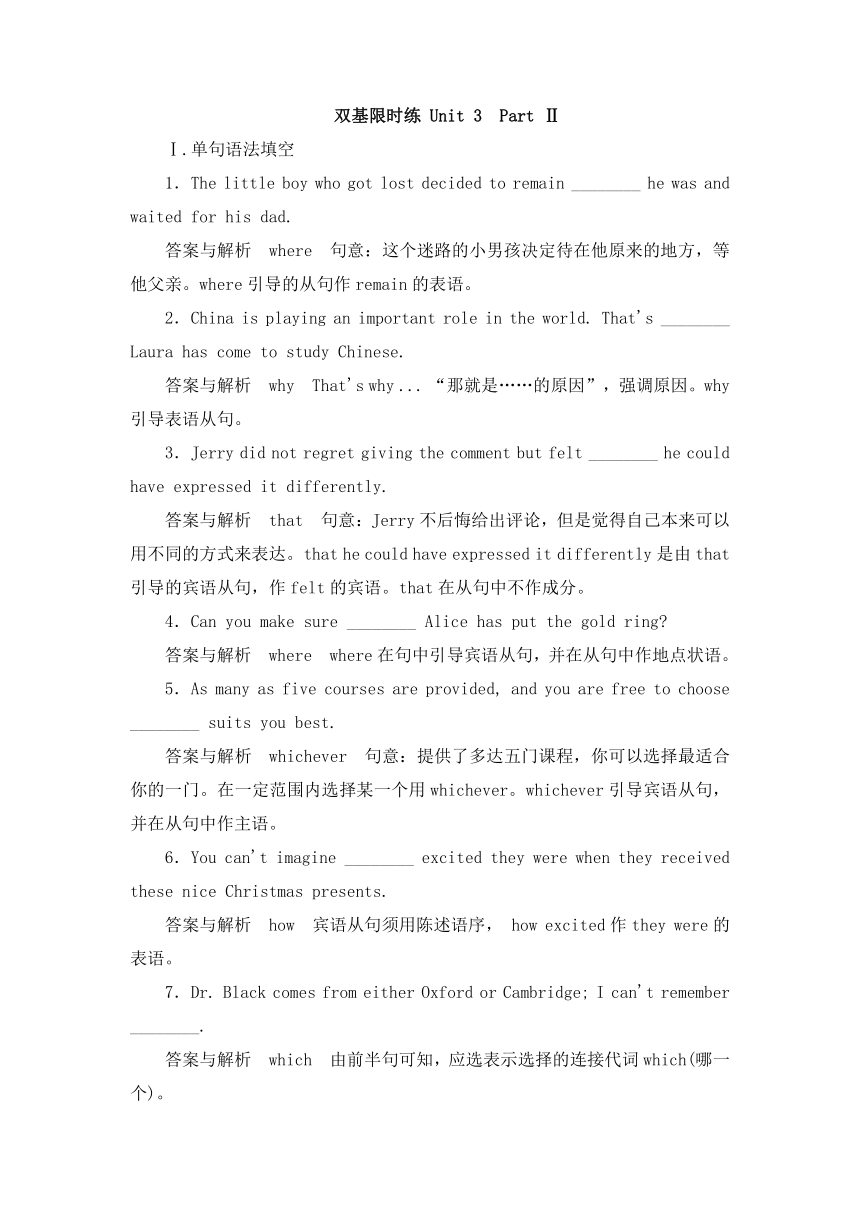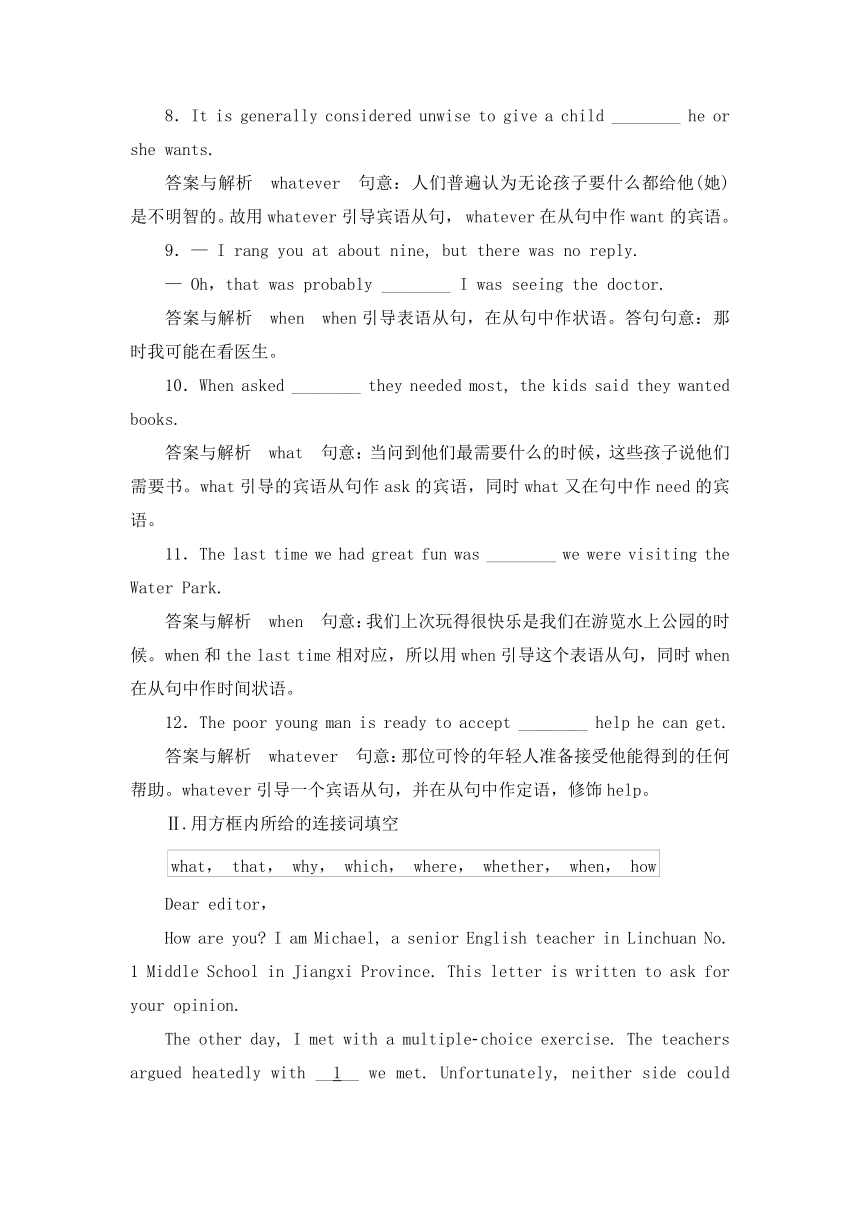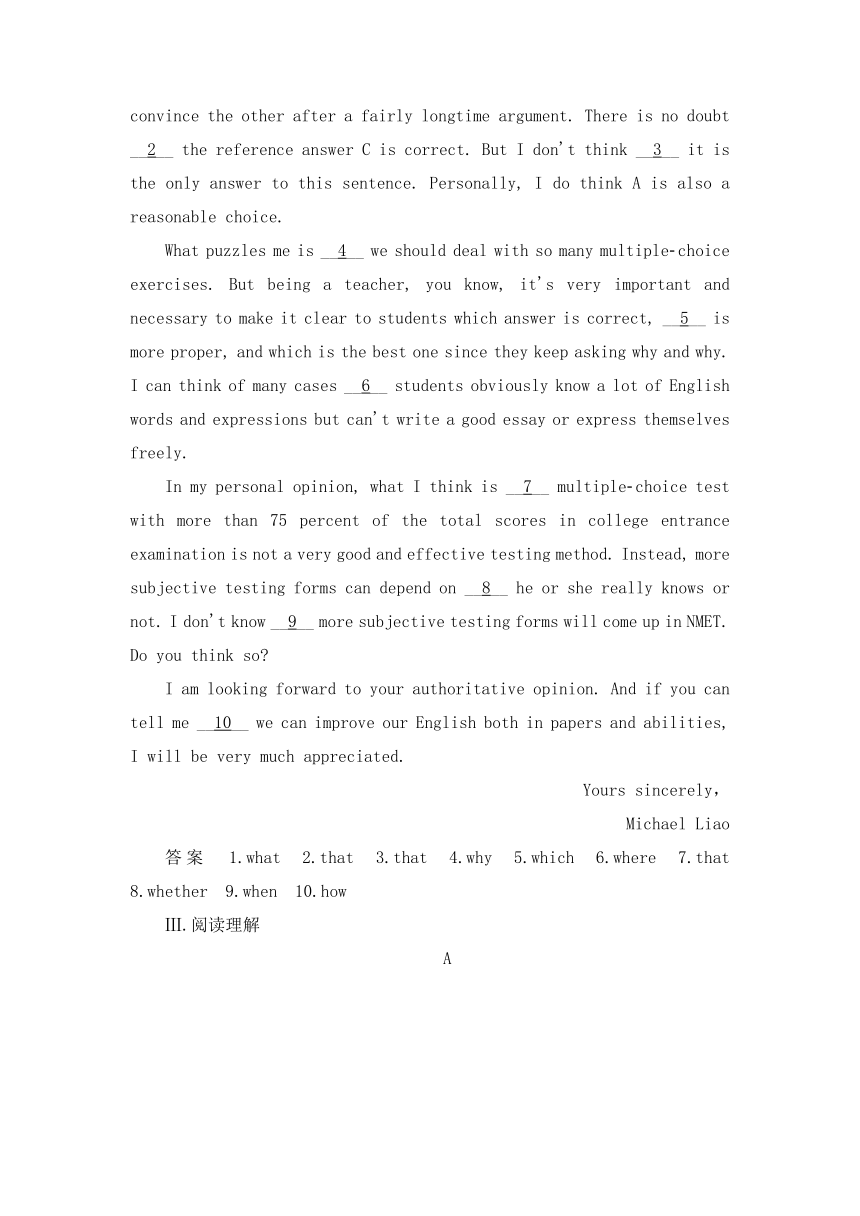2015-2016学年高中英语 Unit 3 The Million Pound Bank Note Part Ⅱ Learning about Language双基限时练(含答案解析)
文档属性
| 名称 | 2015-2016学年高中英语 Unit 3 The Million Pound Bank Note Part Ⅱ Learning about Language双基限时练(含答案解析) |

|
|
| 格式 | zip | ||
| 文件大小 | 501.8KB | ||
| 资源类型 | 教案 | ||
| 版本资源 | 人教版(新课程标准) | ||
| 科目 | 英语 | ||
| 更新时间 | 2016-04-15 00:00:00 | ||
图片预览



文档简介
双基限时练 Unit 3 Part Ⅱ
Ⅰ.单句语法填空
1.The little boy who got lost decided to remain ________ he was and waited for his dad.
答案与解析 where 句意:这个迷路的小男孩决定待在他原来的地方,等他父亲。where引导的从句作remain的表语。
2.China is playing an important role in the world. That's ________ Laura has come to study Chinese.
答案与解析 why That's why ... “那就是……的原因”,强调原因。why引导表语从句。
3.Jerry did not regret giving the comment but felt ________ he could have expressed it differently.
答案与解析 that 句意:Jerry不后悔给出评论,但是觉得自己本来可以用不同的方式来表达。that he could have expressed it differently是由that引导的宾语从句,作felt的宾语。that在从句中不作成分。
4.Can you make sure ________ Alice has put the gold ring
答案与解析 where where在句中引导宾语从句,并在从句中作地点状语。
5.As many as five courses are provided, and you are free to choose ________ suits you best.
答案与解析 whichever 句意:提供了多达五门课程,你可以选择最适合你的一门。在一定范围内选择某一个用whichever。whichever引导宾语从句,并在从句中作主语。
6.You can't imagine ________ excited they were when they received these nice Christmas presents.
答案与解析 how 宾语从句须用陈述语序, how excited作they were的表语。
7.Dr. Black comes from either Oxford or Cambridge; I can't remember ________.
答案与解析 which 由前半句可知,应选表示选择的连接代词which(哪一个)。
8.It is generally considered unwise to give a child ________ he or she wants.
答案与解析 whatever 句意:人们普遍认为无论孩子要什么都给他(她)是不明智的。故用whatever引导宾语从句, whatever在从句中作want的宾语。
9.— I rang you at about nine, but there was no reply.
— Oh,that was probably ________ I was seeing the doctor.
答案与解析 when when引导表语从句,在从句中作状语。答句句意:那时我可能在看医生。
10.When asked ________ they needed most, the kids said they wanted books.
答案与解析 what 句意:当问到他们最需要什么的时候,这些孩子说他们需要书。what引导的宾语从句作ask的宾语,同时what又在句中作need的宾语。
11.The last time we had great fun was ________ we were visiting the Water Park.
答案与解析 when 句意:我们上次玩得很快乐是我们在游览水上公园的时候。when和the last time相对应,所以用when引导这个表语从句,同时when在从句中作时间状语。
12.The poor young man is ready to accept ________ help he can get.
答案与解析 whatever 句意:那位可怜的年轻人准备接受他能得到的任何帮助。whatever引导一个宾语从句,并在从句中作定语,修饰help。
Ⅱ.用方框内所给的连接词填空
Dear editor,
How are you I am Michael, a senior English teacher in Linchuan No. 1 Middle School in Jiangxi Province. This letter is written to ask for your opinion.
The other day, I met with a multiple choice exercise. The teachers argued heatedly with __1__ we met. Unfortunately, neither side could convince the other after a fairly longtime argument. There is no doubt __2__ the reference answer C is correct. But I don't think __3__ it is the only answer to this sentence. Personally, I do think A is also a reasonable choice.
What puzzles me is __4__ we should deal with so many multiple choice exercises. But being a teacher, you know, it's very important and necessary to make it clear to students which answer is correct, __5__ is more proper, and which is the best one since they keep asking why and why. I can think of many cases __6__ students obviously know a lot of English words and expressions but can't write a good essay or express themselves freely.
In my personal opinion, what I think is __7__ multiple choice test with more than 75 percent of the total scores in college entrance examination is not a very good and effective testing method. Instead, more subjective testing forms can depend on __8__ he or she really knows or not. I don't know __9__ more subjective testing forms will come up in NMET. Do you think so
I am looking forward to your authoritative opinion. And if you can tell me __10__ we can improve our English both in papers and abilities, I will be very much appreciated.
Yours sincerely,
Michael Liao
答案 1.what 2.that 3.that 4.why 5.which 6.where 7.that 8.whether 9.when 10.how
Ⅲ.阅读理解
A
Hobbs was an orphan (孤儿). He worked in a factory and every day he got a little money. Hard work made him thin and weak. He wanted to borrow a lot of money to learn to paint pictures, but he did not think he could pay off the debts.
One day a lawyer said to him, “One thousand dollars, and here is the money.” As Hobbs took the package of notes, he was very dumbfounded. He didn't know where the money came from and how to spend it. He said to himself, “I could go to find a hotel and live like a rich man for a few days; or I give up my work in the factory and do what I'd like to do—painting pictures. I could do that for a few weeks, but what would I do after that I should have lost my place in the factory and have no money to live on. If it were a little less money, I would buy a new coat, or a radio, or give a dinner to my friends. If it were more, I could give up the work and pay for painting pictures. But it's too much for one and too little for the other.”
“Here is the reading of your uncle's will (遗嘱),” said the lawyer, “telling what is to be done with this money after his death. I must ask you to remember one point. Your uncle has said you must bring me a paper showing exactly what you did with his money, as soon as you have spent it.” “Yes, I see. I'll do that,” said the young man.
1.Hobbs wanted to borrow money to ________.
A. study abroad
B. work abroad
C. pay off the debts
D. learn to paint pictures
答案与解析 D 根据第一段最后一句可知答案为D项。
2.What does the underlined word “dumbfounded” (in Paragraph 2) probably mean
A. Surprised. B. Frightened.
C. Satisfied. D. Excited.
答案与解析 A 突然有一天, Hobbs收到一笔钱,他自然感到吃惊。而D项干扰性较强。dumbfounded意为“目瞪口呆的”。
3.With the money he got, at first Hobbs ________.
A. planned to have a happy life for a few days
B. decided to give up his work in the factory
C. was to give a dinner to his friends
D. had no idea what to do
答案与解析 D 第二段画线单词后面一句话:“他不知道钱是从哪来的,也不知道怎样花掉它。”以及后文内容可知D项正确。
4.Hobbs was asked to ________.
A. tell the lawyer what he did with the money after spending it
B. read his uncle's will
C. tell the lawyer what was to be done with the money
D. buy some pictures
答案与解析 A 根据最后一段内容可知答案为A项。
B
What happens to old school buses when they can no longer safely carry kids to school Most go to waste factories to be changed into pieces of metal. But_a_few_of_the_old_vehicles_(车辆)_find_new_lives_in_the_center_of_Africa. Most of those buses end up on the streets of Kinshasa, the capital of the Democratic Republic of the Congo.
The Kinshasa buses are that yellow colour, which makes them stand out (突出) in the city's heavy traffic, but the buses don't look at all as they did in the United States. In Kinshasa their taillights (尾灯) are almost all missing or broken. They don't obey traffic rules and often race around the city very fast. The buses compete with motorcycles,cars,trucks,and other vehicles for space on the road. They make loud sounds when moving,and they are packed with people carrying loads of goods, such as fish, milk, beans and onions.
However, Kinshasa business people love the old, yellow buses, which they buy from American companies, because the vehicles are strong, reliable (可依靠的) and inexpensive. A used bus sells for about $2, 000 in Congo. A new bus is more expensive. In the United States, a new school bus with all its lights working costs about $80,000.
The fare (票价) to travel across the city is usually about 30 US cents. “Transport is a big problem in Kinshasa,”says passenger Bruce Kingambo. “But the yellow buses help people here get around.”
5.The underlined sentence in the first paragraph means “In the center of Africa some old US school buses can be ________.”
A. useful B. expensive
C. free D. new
答案与解析 A 根据文章内容可知,已被报废的美国校车在Kinshasa却被用做很重要的交通工具。故选A项。
6.Before the school buses leave America for Congo, they ________.
A. have broken taillights
B. don't obey the traffic rules and move at a full speed
C. carry many people and goods
D. don't compete with other vehicles
答案与解析 D 根据文章的第二段第一句可知,美国的公共汽车不同于Kinshasa的公共汽车。接下来的几句话描述的是Kinshasa的公共汽车,其中包括车灯大多是坏的,不遵守交通规则,和其他车辆抢道,承载很多人和货物;只有选项D与之不相符,因此可推断这是校车在美国时的状况。故选D项。
7.How many used buses can you buy in Congo for the price of a completely new school bus in the US
A. 10. B. 20.
C. 30. D. 40.
答案与解析 D 由文章倒数第二段可知,一辆旧的公共汽车在刚果价值2000美元,而在美国一辆全新的校车价值80000美元,所以用80000美元可以在刚果买40辆旧公共汽车。
8.What's the main idea of the third and the fourth paragraphs
A. The old, yellow school buses have many advantages.
B. All Kinshasa people love the old school buses.
C. It's convenient to get around Kinshasa on the old buses.
D. New buses are too expensive for Kinshasa people.
答案与解析 A 本文结构比较明确,第一段总述美国的报废旧校车在Kinshasa可以继续使用;第二段说明这些车的缺点;第三、四段说明这些车的优点。B项说法过于绝对;C、D两项是相关细节不是主旨。
Ⅰ.单句语法填空
1.The little boy who got lost decided to remain ________ he was and waited for his dad.
答案与解析 where 句意:这个迷路的小男孩决定待在他原来的地方,等他父亲。where引导的从句作remain的表语。
2.China is playing an important role in the world. That's ________ Laura has come to study Chinese.
答案与解析 why That's why ... “那就是……的原因”,强调原因。why引导表语从句。
3.Jerry did not regret giving the comment but felt ________ he could have expressed it differently.
答案与解析 that 句意:Jerry不后悔给出评论,但是觉得自己本来可以用不同的方式来表达。that he could have expressed it differently是由that引导的宾语从句,作felt的宾语。that在从句中不作成分。
4.Can you make sure ________ Alice has put the gold ring
答案与解析 where where在句中引导宾语从句,并在从句中作地点状语。
5.As many as five courses are provided, and you are free to choose ________ suits you best.
答案与解析 whichever 句意:提供了多达五门课程,你可以选择最适合你的一门。在一定范围内选择某一个用whichever。whichever引导宾语从句,并在从句中作主语。
6.You can't imagine ________ excited they were when they received these nice Christmas presents.
答案与解析 how 宾语从句须用陈述语序, how excited作they were的表语。
7.Dr. Black comes from either Oxford or Cambridge; I can't remember ________.
答案与解析 which 由前半句可知,应选表示选择的连接代词which(哪一个)。
8.It is generally considered unwise to give a child ________ he or she wants.
答案与解析 whatever 句意:人们普遍认为无论孩子要什么都给他(她)是不明智的。故用whatever引导宾语从句, whatever在从句中作want的宾语。
9.— I rang you at about nine, but there was no reply.
— Oh,that was probably ________ I was seeing the doctor.
答案与解析 when when引导表语从句,在从句中作状语。答句句意:那时我可能在看医生。
10.When asked ________ they needed most, the kids said they wanted books.
答案与解析 what 句意:当问到他们最需要什么的时候,这些孩子说他们需要书。what引导的宾语从句作ask的宾语,同时what又在句中作need的宾语。
11.The last time we had great fun was ________ we were visiting the Water Park.
答案与解析 when 句意:我们上次玩得很快乐是我们在游览水上公园的时候。when和the last time相对应,所以用when引导这个表语从句,同时when在从句中作时间状语。
12.The poor young man is ready to accept ________ help he can get.
答案与解析 whatever 句意:那位可怜的年轻人准备接受他能得到的任何帮助。whatever引导一个宾语从句,并在从句中作定语,修饰help。
Ⅱ.用方框内所给的连接词填空
Dear editor,
How are you I am Michael, a senior English teacher in Linchuan No. 1 Middle School in Jiangxi Province. This letter is written to ask for your opinion.
The other day, I met with a multiple choice exercise. The teachers argued heatedly with __1__ we met. Unfortunately, neither side could convince the other after a fairly longtime argument. There is no doubt __2__ the reference answer C is correct. But I don't think __3__ it is the only answer to this sentence. Personally, I do think A is also a reasonable choice.
What puzzles me is __4__ we should deal with so many multiple choice exercises. But being a teacher, you know, it's very important and necessary to make it clear to students which answer is correct, __5__ is more proper, and which is the best one since they keep asking why and why. I can think of many cases __6__ students obviously know a lot of English words and expressions but can't write a good essay or express themselves freely.
In my personal opinion, what I think is __7__ multiple choice test with more than 75 percent of the total scores in college entrance examination is not a very good and effective testing method. Instead, more subjective testing forms can depend on __8__ he or she really knows or not. I don't know __9__ more subjective testing forms will come up in NMET. Do you think so
I am looking forward to your authoritative opinion. And if you can tell me __10__ we can improve our English both in papers and abilities, I will be very much appreciated.
Yours sincerely,
Michael Liao
答案 1.what 2.that 3.that 4.why 5.which 6.where 7.that 8.whether 9.when 10.how
Ⅲ.阅读理解
A
Hobbs was an orphan (孤儿). He worked in a factory and every day he got a little money. Hard work made him thin and weak. He wanted to borrow a lot of money to learn to paint pictures, but he did not think he could pay off the debts.
One day a lawyer said to him, “One thousand dollars, and here is the money.” As Hobbs took the package of notes, he was very dumbfounded. He didn't know where the money came from and how to spend it. He said to himself, “I could go to find a hotel and live like a rich man for a few days; or I give up my work in the factory and do what I'd like to do—painting pictures. I could do that for a few weeks, but what would I do after that I should have lost my place in the factory and have no money to live on. If it were a little less money, I would buy a new coat, or a radio, or give a dinner to my friends. If it were more, I could give up the work and pay for painting pictures. But it's too much for one and too little for the other.”
“Here is the reading of your uncle's will (遗嘱),” said the lawyer, “telling what is to be done with this money after his death. I must ask you to remember one point. Your uncle has said you must bring me a paper showing exactly what you did with his money, as soon as you have spent it.” “Yes, I see. I'll do that,” said the young man.
1.Hobbs wanted to borrow money to ________.
A. study abroad
B. work abroad
C. pay off the debts
D. learn to paint pictures
答案与解析 D 根据第一段最后一句可知答案为D项。
2.What does the underlined word “dumbfounded” (in Paragraph 2) probably mean
A. Surprised. B. Frightened.
C. Satisfied. D. Excited.
答案与解析 A 突然有一天, Hobbs收到一笔钱,他自然感到吃惊。而D项干扰性较强。dumbfounded意为“目瞪口呆的”。
3.With the money he got, at first Hobbs ________.
A. planned to have a happy life for a few days
B. decided to give up his work in the factory
C. was to give a dinner to his friends
D. had no idea what to do
答案与解析 D 第二段画线单词后面一句话:“他不知道钱是从哪来的,也不知道怎样花掉它。”以及后文内容可知D项正确。
4.Hobbs was asked to ________.
A. tell the lawyer what he did with the money after spending it
B. read his uncle's will
C. tell the lawyer what was to be done with the money
D. buy some pictures
答案与解析 A 根据最后一段内容可知答案为A项。
B
What happens to old school buses when they can no longer safely carry kids to school Most go to waste factories to be changed into pieces of metal. But_a_few_of_the_old_vehicles_(车辆)_find_new_lives_in_the_center_of_Africa. Most of those buses end up on the streets of Kinshasa, the capital of the Democratic Republic of the Congo.
The Kinshasa buses are that yellow colour, which makes them stand out (突出) in the city's heavy traffic, but the buses don't look at all as they did in the United States. In Kinshasa their taillights (尾灯) are almost all missing or broken. They don't obey traffic rules and often race around the city very fast. The buses compete with motorcycles,cars,trucks,and other vehicles for space on the road. They make loud sounds when moving,and they are packed with people carrying loads of goods, such as fish, milk, beans and onions.
However, Kinshasa business people love the old, yellow buses, which they buy from American companies, because the vehicles are strong, reliable (可依靠的) and inexpensive. A used bus sells for about $2, 000 in Congo. A new bus is more expensive. In the United States, a new school bus with all its lights working costs about $80,000.
The fare (票价) to travel across the city is usually about 30 US cents. “Transport is a big problem in Kinshasa,”says passenger Bruce Kingambo. “But the yellow buses help people here get around.”
5.The underlined sentence in the first paragraph means “In the center of Africa some old US school buses can be ________.”
A. useful B. expensive
C. free D. new
答案与解析 A 根据文章内容可知,已被报废的美国校车在Kinshasa却被用做很重要的交通工具。故选A项。
6.Before the school buses leave America for Congo, they ________.
A. have broken taillights
B. don't obey the traffic rules and move at a full speed
C. carry many people and goods
D. don't compete with other vehicles
答案与解析 D 根据文章的第二段第一句可知,美国的公共汽车不同于Kinshasa的公共汽车。接下来的几句话描述的是Kinshasa的公共汽车,其中包括车灯大多是坏的,不遵守交通规则,和其他车辆抢道,承载很多人和货物;只有选项D与之不相符,因此可推断这是校车在美国时的状况。故选D项。
7.How many used buses can you buy in Congo for the price of a completely new school bus in the US
A. 10. B. 20.
C. 30. D. 40.
答案与解析 D 由文章倒数第二段可知,一辆旧的公共汽车在刚果价值2000美元,而在美国一辆全新的校车价值80000美元,所以用80000美元可以在刚果买40辆旧公共汽车。
8.What's the main idea of the third and the fourth paragraphs
A. The old, yellow school buses have many advantages.
B. All Kinshasa people love the old school buses.
C. It's convenient to get around Kinshasa on the old buses.
D. New buses are too expensive for Kinshasa people.
答案与解析 A 本文结构比较明确,第一段总述美国的报废旧校车在Kinshasa可以继续使用;第二段说明这些车的缺点;第三、四段说明这些车的优点。B项说法过于绝对;C、D两项是相关细节不是主旨。
同课章节目录
